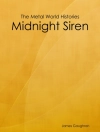In ‘Lord of the World, ‘ Robert Hugh Benson presents a hauntingly prophetic vision of a dystopian future where materialism and secularism have supplanted spiritual values. Set in the early 21st century, the novel explores the rise of a totalitarian regime and the societal decay that accompanies it, offering a rich tapestry of philosophical and theological musings woven into its narrative. Benson’s literary style is marked by a blend of vivid imagery and incisive dialogue, echoing the traditions of both Gothic literature and early 20th-century speculative fiction. The novel serves as a cautionary tale, capturing the zeitgeist of a post-World War I Europe grappling with the consequences of rapid industrialization and religious disillusionment. Robert Hugh Benson, an English Roman Catholic priest and author, was deeply concerned with the moral and spiritual crises of his time. Raised in a prominent Anglican family, he converted to Catholicism, which profoundly influenced his worldview and literary output. His experiences, coupled with his position within the Church, informed his exploration of themes such as faith, authority, and the conflict between belief and modernity, positioning him as a prescient commentator on 20th-century society. ‘Lord of the World’ is highly recommended for readers interested in dystopian literature and those who seek to engage with profound philosophical questions regarding faith and society. Benson’s intricate narrative invites contemplation on the balance between human freedom and authoritarian control, a theme that remains strikingly relevant today. This book not only serves as a gripping read but also as a significant contribution to the dialogue on the future of human civilization.
เกี่ยวกับผู้แต่ง
Robert Hugh Benson (1871–1914) was an English Anglican priest who converted to Roman Catholicism in 1903, subsequently becoming ordained as a Catholic priest. He was a prolific writer, known particularly for his works of fiction, including his dystopian novel ‘Lord of the World’ (1907). Benson hailed from a notably ecclesiastical family; he was the youngest son of Edward White Benson, the Archbishop of Canterbury, which made his conversion a matter of public controversy at the time. His literary style often fused his deep religious convictions with his imaginative storytelling, allowing him to explore complex themes of spirituality and morality. ‘Lord of the World’ is one of Benson’s best-known works and is considered a prophetic narrative, detailing a futuristic world where secular humanism has triumphed and religion is on the brink of extinction. It is often mentioned alongside other dystopian classics like Aldous Huxley’s ‘Brave New World’ and George Orwell’s ‘1984’, although it precedes them both. In addition to fiction, Benson was also a respected writer of devotional and theological texts, reflecting his commitment to his faith and his literary talent. Despite his early death at the age of 42, Benson’s contributions to religious literature and early 20th-century fiction remain influential.












